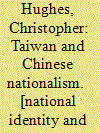| Srl | Item |
| 1 |
ID:
091638


|
|
|
|
|
| Publication |
2009.
|
| Summary/Abstract |
Japan and China's ability to manage their bilateral relationship is crucial for the stability of the East Asian region. It also has a global impact on the security and economic development of other regions. For just as China's rise has inevitably involved an expansion of its global reach, so Japan's responses to the challenges posed by China have increasingly taken a global form, seeking to incorporate new partners and frameworks outside East Asia. Japan's preferred response to China's regional and global rise in the post-Cold War period has remained one of default engagement. Japan is intent on promoting China's external engagement with the East Asia region and its internal domestic reform, through upgrading extant bilateral and Japan-China-US trilateral frameworks for dialogue and cooperation, and by emphasizing the importance of economic power to influence China. Japan is deliberately seeking to proliferate regional frameworks for cooperation in East Asia in order to dilute, constrain and ultimately engage China's rising power. However, Japan's engagement strategy also contains the potential to tilt towards default containment. Japan's domestic political basis for engagement is becoming increasingly precarious as China's rise stimulates Japanese revisionism and nationalism. Japan also appears increasingly to be looking to contain China on a global scale by forging new strategic links in Russia and Central Asia, with a 'concert of democracies' involving India, Australia and the US, by competing for resources with China in Africa and the Middle East, and by attempting to articulate a values-based diplomacy to check the so-called 'Beijing consensus'. Nevertheless, Japan's perceived inability to channel China's rise either through regional engagement or through global containment carries a further risk of pushing Japan to resort to the strengthening of its military power in an attempt to guarantee its essential national interests. It is in this instance that Japan and China run the danger of a military collision.
|
|
|
|
|
|
|
|
|
|
|
|
|
|
|
|
| 2 |
ID:
105831


|
|
|
|
|
| Publication |
2011.
|
| Summary/Abstract |
This article assesses the rise of China by exploring a number of recent popular Chinese political texts to go beyond explanations that take the international system as the level of analysis. It proposes that a merging of nationalism and geopolitical thinking is taking place, resulting in the emergence of a new form of nationalism that can be categorised as 'geopolitik nationalism' because it deploys many of the themes evident in the political thought of Germany and Japan before the two world wars. By considering the impact of such ideas, it is possible to gain new insights into recent assertive actions in Chinese foreign policy.
|
|
|
|
|
|
|
|
|
|
|
|
|
|
|
|
| 3 |
ID:
080544


|
|
|
|
|
| Publication |
London, Routledge, 1997.
|
| Description |
186p.
|
| Standard Number |
0415157684
|
|
|
|
|
|
|
|
|
|
|
|
Copies: C:1/I:0,R:0,Q:0
Circulation
| Accession# | Call# | Current Location | Status | Policy | Location |
| 044485 | 320.540951/HUG 044485 | Main | On Shelf | General | |
|
|
|
|